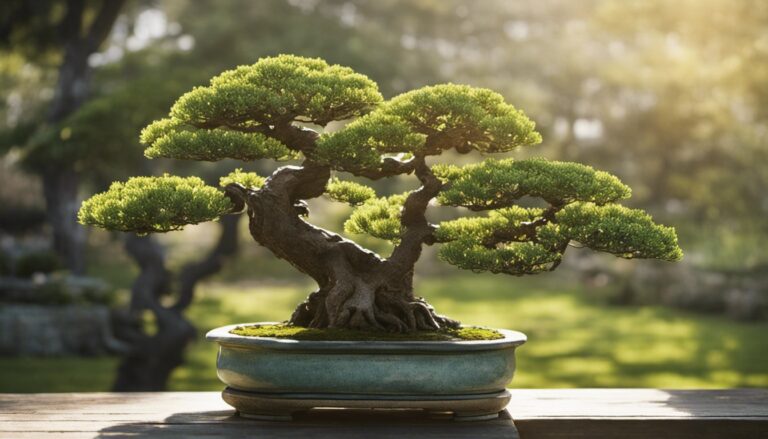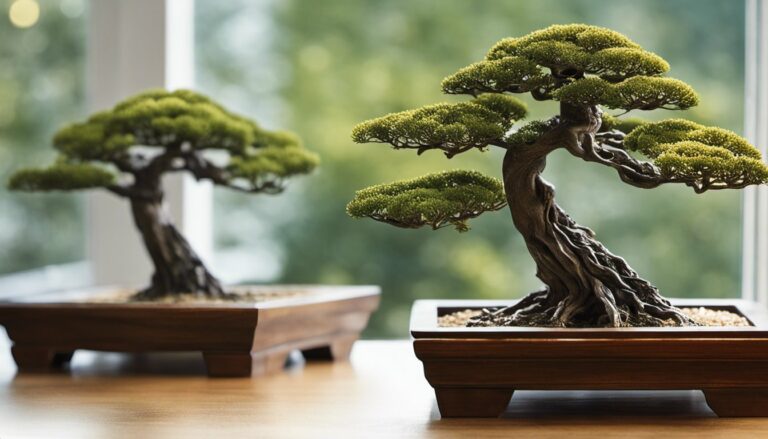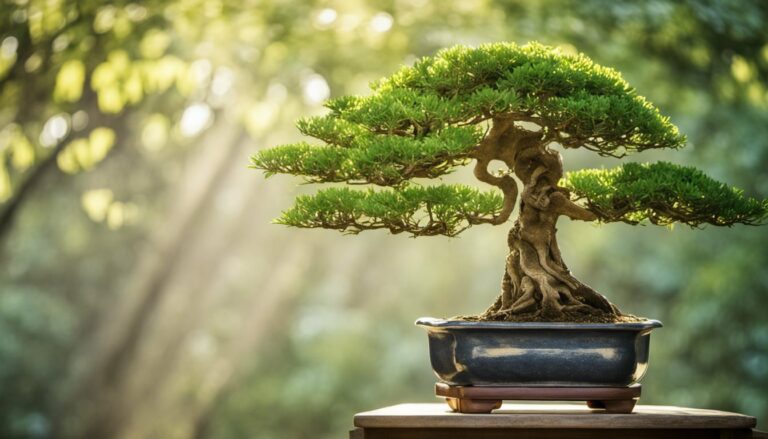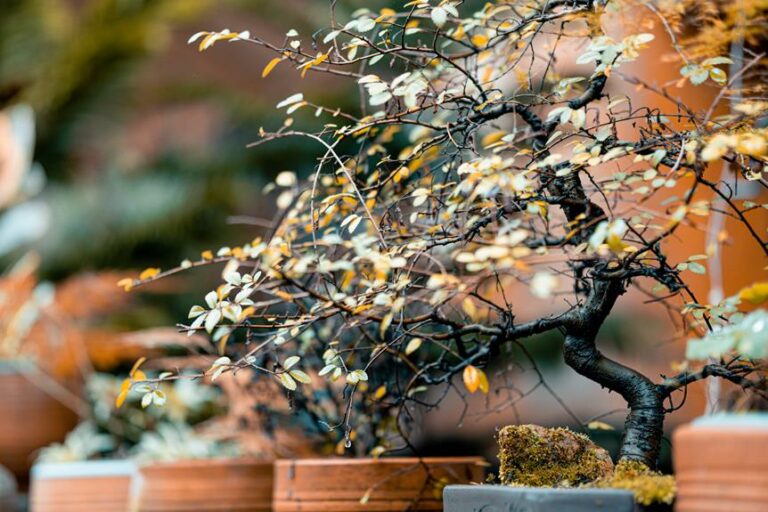Foxes Devour Bonsai Trees: How to Protect Your Prized Plants
Are you a bonsai lover living in fear of foxes destroying your beloved plants? Don't panic! This article will provide you with practical solutions to safeguard your precious bonsai trees.
While it may sound extreme, the truth is that foxes can pose a threat to fruiting bonsai species. These crafty creatures may be tempted by the fruit or insects residing in your bonsai trees, especially during their nighttime scavenging escapades.
But fret not! We will show you how to keep your bonsai trees safe by bringing them indoors at night, avoiding fruiting species, eliminating potential prey, and maintaining a clean garden. We'll even discuss the option of keeping your bonsai trees indoors during peak fox activity.
With these tips, your bonsai trees will flourish without becoming a fox's feast!
Key Takeaways
- Foxes may eat fruits from bonsai trees, so fruiting bonsai species may be at risk.
- Keeping bonsai trees indoors during the night when foxes are scavenging can prevent damage.
- Avoid keeping fruiting bonsai species that attract foxes.
- Securely lock away trash to prevent foxes from rummaging around in search of food.
Foxes and Bonsai Trees
To protect your prized bonsai trees from foxes, take precautions to prevent their access to the plants. While foxes are primarily carnivores and don't typically eat bonsai trees, they may still pose a threat.
Fruiting bonsai species are especially vulnerable, as foxes may eat the fruits or feed on insects nesting in the trees. To prevent damage, keep your bonsai trees indoors overnight in a secure location. Avoid keeping fruiting bonsai species that attract foxes, and remove potential prey such as insects and rodents from the trees.
Additionally, keep trash locked away to avoid attracting foxes to your garden. By following these steps, you can ensure the safety and well-being of your beloved bonsai trees.
Preventing Foxes From Eating Bonsai Trees
To prevent foxes from eating your bonsai trees, you should take certain measures to protect your prized plants. Here are some practical tips to keep foxes away from your bonsai trees:
| Measures | Description |
|---|---|
| Keep bonsai trees indoors overnight | Secure your bonsai trees in a location that is inaccessible to foxes during the night. This will prevent them from causing any damage. |
| Avoid fruiting bonsai species | Foxes are attracted to the fruit of bonsai trees. Opt for bonsai species like Chinese elm or ficus that do not bear fruit to reduce the risk of foxes being drawn to your trees. |
| Remove potential prey | Regularly check your bonsai trees for insects and rodents. By removing these potential food sources, you can discourage foxes from being interested in your plants. |
| Keep trash locked away | Foxes are scavengers and can be attracted to gardens with accessible trash. Securely lock away your trash to prevent foxes from being lured to the area where your bonsai trees are located. |
Keeping Bonsai Trees Indoors
Bring your bonsai trees indoors during the night to protect them from foxes. Foxes prefer to stay outdoors and rarely venture indoors. By keeping your bonsai trees indoors during the night when foxes are scavenging, you can prevent damage to your prized plants.
This simple step will allow your bonsai trees to receive enough sunlight during the day to thrive. Consider keeping indoor bonsai species like ficus or Chinese elms, as they're well-suited for indoor environments.
Moving your bonsai trees indoors during fox activity hours can provide the protection they need. By taking this proactive measure, you can ensure that your bonsai trees remain safe and secure from any potential harm caused by foxes.
Avoiding Fruiting Bonsai
When preventing foxes from eating your bonsai trees, it's important to avoid keeping bonsai species that bear fruit, such as lime, lemon, apple, orange, and crab apple. Foxes are more attracted to the fruit of bonsai trees rather than the leaves, bark, or branches. Opt for bonsai species like Chinese elm or ficus that don't bear fruit.
By avoiding fruiting bonsai, foxes and other pests are less likely to be attracted to the trees. This simple step can help protect your prized plants from being devoured. Remember, foxes are opportunistic hunters and may eat the fruit on bonsai trees if they're in the vicinity.
Keeping Trash Locked Away
Securely lock away trash to prevent foxes from rummaging around in search of food. Foxes are opportunistic hunters and are attracted to the smell of off and rotten foods. Trash in the garden can attract foxes to the area where bonsai trees are located, putting them at risk. If foxes find trash nearby, they may be more inclined to approach the bonsai trees and potentially eat the fruit on them.
To avoid this, it's important to keep the garden clean and free of accessible trash. Make sure to secure all garbage cans with tight-fitting lids or use lockable bins to prevent foxes from accessing them. Additionally, regularly dispose of any food waste in a sealed and odor-proof container.
Choosing Non-Fruiting Bonsai Species
To minimize the risk of foxes devouring your bonsai trees, opt for non-fruiting bonsai species that are less attractive to these cunning predators. Foxes are primarily carnivores, but they may eat fruits from bonsai trees, making fruiting bonsai species more vulnerable.
By choosing bonsai species that don't bear fruit, like Chinese elm or ficus, you can reduce the chances of foxes being attracted to your trees. Foxes are more interested in the fruit than the leaves, bark, or branches of bonsai trees.
Removing Prey From Bonsai Trees
By removing potential prey such as insects and rodents, you can protect your bonsai trees from being targeted by foxes. Foxes are opportunistic hunters, and they may feed on insects nesting in bonsai trees or be attracted to rodents lurking around the plants.
To prevent foxes from devouring your prized bonsai trees, follow these practical tips:
- Regularly inspect your bonsai trees for signs of insect infestation and promptly eliminate any pests.
- Keep the area around your bonsai trees clean and free of debris to discourage rodents from taking up residence.
- Consider using natural repellents or deterrents, such as predator urine or motion-activated sprinklers, to keep foxes away from your bonsai trees.
Foxes' Nocturnal Feeding Habits
To protect your prized bonsai trees from being devoured by foxes, it's important to understand their nocturnal feeding habits. Foxes are primarily carnivores, but they may eat fruits from bonsai trees and feed on insects nesting in them. They usually indulge in this behavior during the night, as they're nocturnal animals.
However, bonsai trees can be toxic to foxes, as they're part of the canine family. To prevent foxes from eating your bonsai trees, keep them indoors overnight in a secure location. Avoid keeping fruiting bonsai species that attract foxes, and remove potential prey such as insects and rodents from the trees.
Additionally, make sure there's no trash lying around near the bonsai trees and keep trash locked away to avoid attracting foxes to your garden.
Foxes' Sensitivity to Bonsai Toxicity
Foxes' Sensitivity to Bonsai Toxicity
Foxes' sensitivity to the toxicity of bonsai trees can be a concern when it comes to protecting your prized plants. Here are a few important points to keep in mind:
- Foxes are part of the canine family: Bonsai trees can be toxic to foxes, just like certain plants can be harmful to dogs. It's important to be aware of the potential risks.
- Avoid toxic bonsai species: Some bonsai species may contain toxins that can be harmful to foxes if ingested. Research and choose bonsai species that are known to be safe for animals.
- Secure bonsai trees: To protect your bonsai trees from foxes, make sure they're securely placed in areas that are inaccessible to these animals. Consider using fences or placing the bonsai trees indoors during nighttime when foxes are most active.
Importance of Sunlight for Bonsai Trees
Maximize the growth of your bonsai trees by ensuring they receive ample sunlight throughout the day. Sunlight is essential for the health and development of bonsai trees. It provides them with the energy needed for photosynthesis, which is crucial for their growth and survival.
Place your bonsai trees in a location where they can receive direct sunlight for at least six hours a day. This can be near a south-facing window or in a well-lit outdoor area. If you keep your bonsai trees indoors, consider using artificial grow lights to supplement the sunlight.
Remember to rotate your trees regularly to ensure even exposure to sunlight. By providing your bonsai trees with the right amount of sunlight, you can promote their overall well-being and enhance their beauty.
Conclusion
In conclusion, by implementing the strategies mentioned in this article, you can effectively protect your beloved bonsai trees from the potential threat of foxes.
Keeping your bonsai trees indoors overnight, avoiding fruiting bonsai species, removing potential prey, and maintaining a clean garden environment are all practical steps you can take to safeguard your prized plants.
Remember, the key is to be proactive and mindful of the specific needs and vulnerabilities of your bonsai trees.
With these measures in place, your bonsai trees can thrive and bring you joy for years to come.







